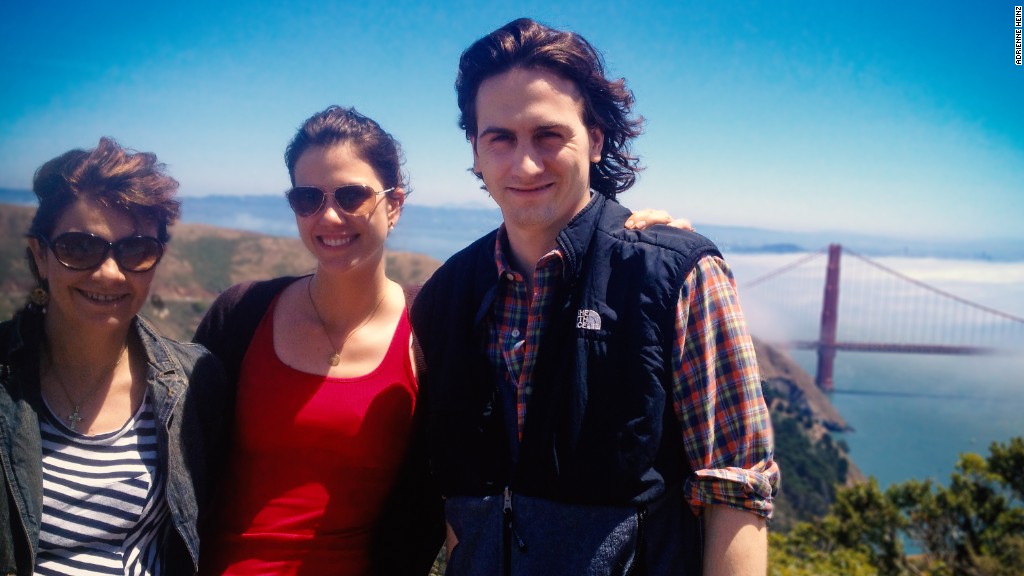
It was a less than a year ago that Adrienne Heinz lost her brother, Austen, who committed suicide after a lifelong battle with depression.
Austen was a science geek and a risk-taker. He enjoyed hiking under the Redwoods and playing with his newborn nephew. He wore flip flops to investor meetings, and embodied the extremes associated with entrepreneurship. He was on the brink of great success and grappling with the rocky road that it took to get there.
Austen had turned his radical idea, a scientific approach to laser-print DNA, into a company, Cambrian Genomics. It had all the makings of a Silicon Valley success story: a disruptive idea, a charismatic founder, a roster of impressive investors. And the media had begun to pick up on it -- his outspoken and sometimes brash nature garnered both good and bad press.
Long before he became an entrepreneur, Austen battled depression. And on May 24, 2015, he ended his life. He was 31 years old.
Those closest to Austen say his struggle with mental illness was magnified by the pressures of running a startup -- pressure he kept to himself.
"He already had those mental health issues and the stress and the challenges of entrepreneurship were just too much," friend and mentor Mike Alfred recalled. "He was fine as long as things were generally going well, but as soon as he experienced too much negativity ... It was like they overflowed and he would go into this spiral."
"This ability to live with uncertainty, to take risks, it pushed him further than he should have gone before he asked for help," his sister Adrienne said.
Related: Coder who committed suicide: Tech was 'bright spot in her life'
Psychiatrist Dr. Michael Freeman studies the relationship between entrepreneurship and depression.
He says many of the personality traits found in entrepreneurs -- creativity, extroversion, open mindedness and a propensity for risk -- are also traits associated with ADHD, bipolar spectrum conditions depression, and substance abuse.
In a study Freeman conducted, nearly half of the entrepreneurs said they experienced mental health issues at some point in their lives.
He says having more resources available would make a huge difference, and he calls for more MBA programs and tech incubators to educate people about mental health issues.
Freeman recalled a conversation with an entrepreneur who wanted to help other people in a similar situation but didn't feel comfortable disclosing his struggles.
"[He] told me that he would really like to help other entrepreneurs but can't because his company is going to be acquired or it's going to be public within the next 12 months," Freeman said. "He's afraid that being associated with those issues could adversely impact the acquisition or the IPO."
This seems to be indicative of a broader trend. Because while Silicon Valley appears to be an open-minded mecca, it's not always a welcoming place for people to honestly discuss their mental health. Startups are encouraged to only let on that they're "crushing it," and founders in the throes of running a company are pressured to put on a good face for investors and employees.
"There's this weird dynamic that happens where when you're weakest, you're most vulnerable, you can't actually share that with your investors," said Alfred. "Because maybe they won't fund you right when you need it."
Related: Does text therapy actually work?
Alfred encourages entrepreneurs struggling with mental health issues to find a network outside the company.
"If the only people you ever talk to are your employees and your investors and your board, you're going to become overly focused on one thing," he says, emphasizing that running a company can be isolating for those who are struggling.
Amy Buechler is a psychotherapist who works at Y Combinator, one of Silicon Valley's most prominent incubators. She said these issues are particularly tricky for entrepreneurs.
"Being open and vulnerable is hard in general -- really hard. Entrepreneurs themselves aren't any more or less afraid of than the rest of us," she said. "What's changing is how society views entrepreneurs -- they're becoming celebrities, and with that comes scrutiny and high expectations."
But she's optimistic that the stigma is starting to disappear -- and Y Combinator is trying to be part of that shift. The accelerator has invested in a nonprofit called Innerspace that hosts workshops on communication and emotional awareness and offers founder-friendly therapists.
"We've negotiated a deal with one of these clinics to lower the cost of therapy," she says. "We're doing everything we can to make it as easy as possible to access psychotherapy so founders are happy and healthy."
Related: Can daily text messages close the confidence gap?
Heinz, meanwhile, hopes to facilitate a discussion in Silicon Valley that goes beyond success stories -- that touches on the darker moments that often accompany those stories.
She had pins made for a suicide prevention walk in San Francisco called "Out of the Darkness." They feature a smiling Austin and read: "We are all creatures, and we need one another."
It's a nod to her brother, who loved science and the idea of creation. They also serve as a message for those who may be suffering.
"It's to say, 'We're a community.' If we don't hold each other up and provide support, it doesn't allow us to thrive."

